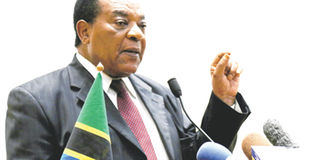Why we remain invisible in the global community

Newly appointed Foreign Affairs minister, Dr Augustine Mahiga.
What you need to know:
He was once the Permanent Representative of Tanzania to the United Nations. Also once the UN special envoy for Somalia, Dr Mahiga is a known diplomat with both professional experience and expertise in international affairs. Some reports have it that since July this year, when it was apparent that Magufuli was going to be president, Dr Mahiga’s name was put forward for the international affairs portfolio.
Newly appointed Foreign Affairs minister, Dr Augustine Mahiga, might not be notably famous in Tanzania. But he is a prominent figure in the international community.
He was once the Permanent Representative of Tanzania to the United Nations. Also once the UN special envoy for Somalia, Dr Mahiga is a known diplomat with both professional experience and expertise in international affairs. Some reports have it that since July this year, when it was apparent that Magufuli was going to be president, Dr Mahiga’s name was put forward for the international affairs portfolio.
A few months later, Dr Mahiga leads one of the most critical ministries. But can he help to boost Tanzania’s standing on the world map?
At the moment, the country is trending on social media, thanks to the attention-grabbing reforms that President Magufuli’s administration has introduced. It is like, Tanzania, for the first time in years, is enjoying worldwide fame.
At this point, therefore, it may be prudent to ask: What exacatly is Tanzania’s place in the international community? This article sheds light on the key issues to be addressed if Tanzania’s interests are to be promoted and defended at the international community level.
Mwalimu Nyerere once said: “In Tanzania, it was more than one hundred tribal units which lost their freedom. It was one nation that regained it.” Tanzania has all it takes to be rich and powerful.
Apart from abundant natural resources, it has more than 50 million people and a total area of 947,303 km2, making it almost thrice Germany, and six times bigger than England.
Burundi, Rwanda and Swaziland together are not as large as Tabora Region. However, this is nearly useless if we do not unite as one for the betterment of our nation. At least one point is clear: Every time, our selfishness has proved to work against us.
Tanzanian expats
You would be surprised that Ivory Coast, which is not even half the size of Tanzania, has many nationals working in international organisations than Tanzania. Our country is almost not represented at all in most international organisations, despite the financial contributions and vote these organisations enjoy from our country. Are Tanzanians not competent? Are they not willing to relocate and work in New York, Geneva, Vienna, Nairobi or Addis Ababa? No!
It’s just because selfishness outweighs national interests. One would opt to pass an opportunity to a non-Tanzanian if none of their family members or close friend qualifies for the post. Very sad but a fact!
Geneva
Geneva is a good example of the invisibility of Tanzanians in the international community. Today, Geneva is home to more than 200 international organisations, including the European headquarters of the United Nations, several UN agencies and numerous NGOs. Close to Geneva you have many sports organisations such as the International Olympic Committee (IOC) in Lausanne, Uefa in Nyon and Fifa in Zürich. Where are Tanzanians? Not there.
Remittances
In 2011, the United Nations Conference on Trade and Development (UNCTAD) reported that citizens of the world’s poorest countries working abroad sent home some $27 billion. Research indicates that most of the money sent home is spent directly by families on vital needs, such as food, clothing, educations, healthcare and housing. We are losing plenty of opportunities. Magufuli’s strong leadership should be reflected abroad. This is only possible through patriotic, hardworking and competent representatives who can ensure the rise of foreign investors, tourists and more foreign opportunities for Tanzanians. Let us hope that Dr Mahiga brings the necessary reforms in foreign services to expose Tanzania in the international arena. In the coming article we will reflect on several strategies to be used for Tanzanians to secure a place with international organisations.
The writer is a Tanzanian expert in diplomacy and international law currently working with United Nations in Geneva




